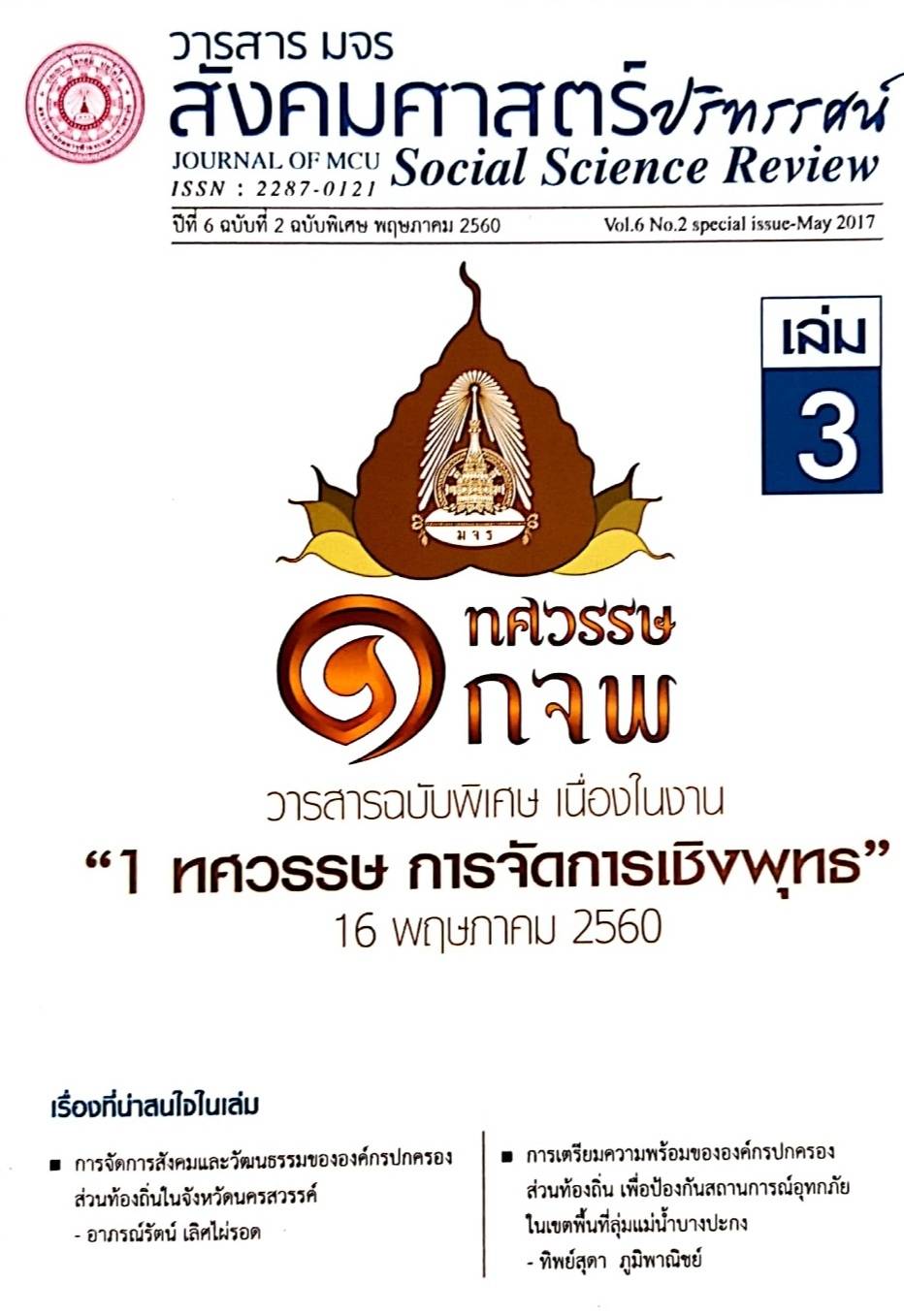ความสุขและความทุกข์ในทัศนะของเจรามี เบนธัม : การศึกษาเชิงวิพากย์
คำสำคัญ:
ความสุขและความทุกข์, เจรามี เบนธัม, พุทธปรัชญา,ความพึงพอใจ, เจตนาบทคัดย่อ
บทความวิจัยเรื่องนี้ มีวัตถุประสงค์ 3 ประการ คือ 1) เพื่อศึกษาแนวคิดความสุข และความทุกข์ในทัศนะของ เจรามี เบนธัม 2) เพื่อศึกษาแนวคิดความสุข และความทุกข์ในทัศนะของ พุทธปรัชญาเถรวาท และ 3) เพื่อวิเคราะห์เชิงวิพากษ์แนวคิดความสุข และความทุกข์ในฐานะรากฐานของระบบ จริยศาสตร์ของเจรามี เบนธัมในทัศนะของพุทธปรัชญาเถรวาท การวิจัยครั้งนี้เป็นการวิจัยเชิงคุณภาพ โดยการศึกษาค้นคว้าข้อมูลตำราทางวิชาการและเอกสารที่เกี่ยวข้อง จากการวิจัยความสุขและความทุกข์ในทัศนะของเจรามี เบนธัม พบว่า
การศึกษาวัตถุประสงค์ข้อที่ 1 พบว่า เจรามี เบนธัม เชื่อว่า ความสุขหรือความพึงพอใจเกิดเป็นพื้นฐานการกระทำ เพื่อให้ได้สิ่งที่ดีที่สุดทางกาย และทางใจ และความทุกข์คือ ความไม่พึงพอใจ เป็นพื้นฐานให้หลีกเลี่ยงความทุกข์ เบนธัม เชื่อว่า เกณฑ์การตัดสินความถูกคือ การได้รับความสุข การกระทำที่ให้เกิดความสุขถือว่าเป็นสิ่งที่ดีที่สุด และเกณฑ์ตัดสินความผิดคือ การความทุกข์ การกระทำที่ให้ความทุกข์ถือว่าเป็นสิ่งที่ต้องหลีกเลี่ยง
การศึกษาวัตถุประสงค์ข้อที่ 2 พบว่า พุทธปรัชญาเชื่อว่า ความสุขหรือสุขเวทนา เป็นความพึงพอใจที่เกิดขึ้นทางกาย และทางจิตใจ และความทุกข์หรือทุกขเวทนา เกิดจากเหตุปัจจัยที่เป็นความรู้สึกมาบีบคั้นทางร่างกาย และทางจิตใจ ในพุทธปรัชญา เชื่อว่า ความสุขในฐานะรากฐานทางศีลธรรมคือ อโลภะ อโทสะ อโมหะ เพราะว่า เป็นผลมาจากกุศลมูลให้มีความประพฤติที่สม่ำเสมอทางกาย ทางวาจา ทางจิตใจ และความทุกข์ในฐานะรากฐานที่ไม่มีศีลธรรมคือ โลภะ โทสะ โมหะ เพราะว่า เป็นผลจากอกุศลมูลซึ่งทำให้มีความประพฤติที่ไม่สม่ำเสมอทั้งทางกาย ทางวาจา ทางจิตใจ
การศึกษาวัตถุประสงค์ข้อที่ 3 พบว่า การวิพากย์พุทธปรัชญาไม่เห็นด้วยกับความเชื่อของเจรามี เบนธัม ที่ว่า ความสุขที่ได้จากความพึงพอใจทางร่างกาย และทางจิตใจสามารถเป็นรากฐานทางศีลธรรม พุทธปรัชญาให้เหตุผลว่า ความสุขที่ใช้เป็นรากฐานทางศีลธรรมควรจะมาจากจิตใจที่ปราศจากกุศลมูล คือ อโลภะ อโทสะ อโมหะ เพราะว่า การใช้ความสุขที่เกิดจากความพึงพอใจเป็นรากฐานทางศีลธรรมเป็นสิ่งที่ไม่แน่นอน เพราะคนแต่ละคนย่อมมีความพึงพอใจต่างกัน และพุทธปรัชญาไม่เห็นด้วยกับเจรามี เบนธัม เชื่อว่า ความทุกข์ที่ทำให้เกิดความไม่พึงพอใจเป็นสิ่งที่ต้องหลีกเลี่ยง ในเรื่องนี้พุทธปรัชญาให้เหตุผลว่า ความทุกข์ที่มาจากการกระทำของ โลภะ โทสะ โมหะเป็นสิ่งที่ควรหลีกเลี่ยง และนำไปใช้เป็นรากฐานทางศีลธรรมไม่ได้ เพราะว่า อกุศลมูลเป็นสาเหตุให้เกิดความทุกข์ จากมุมมองนี้แสดงให้เห็นว่า เบนธัมให้ความสำคัญกับความสุขที่เกิดจากความพึงพอใจ และยังให้ความสำคัญกับความทุกข์ในฐานะเป็นสิ่งที่ให้ความไม่พึงพอใจทางกาย และใช้เป็นรากฐานความผิดศีลธรรม ในเรื่องนี้พุทธปรัชญาเห็นด้วยกับความสุขทางกาย และทางจิตใจในฐานะที่เป็นรากฐานทางศีลธรรม ส่วนในเรื่องความทุกข์นั้น ได้เสนอให้บุคคลกำจัดอกุศลมูลที่เป็นเหตุให้เกิดความทุกข์ทั้งทางร่างกายและจิตใจ จากเหตุผลนี้แสดงให้เห็นว่า แนวคิดของพุทธปรัชญาเกี่ยวกับเรื่องความสุข และความทุกข์ในฐานะเป็นรากฐานทางศีลธรรมตามแนวคิดของเบนธัมจึงมีความแตกต่างกัน
เอกสารอ้างอิง
พระพรหมคุณาภรณ์ (ป.อ.ปยุตฺโต). (2554). พุทธธรรม (ฉบับเดิม). พิมพ์ครั้งที่ 24. กรุงเทพมหานคร : พิมพ์ที่ บริษัท ธรรมสาร จำกัด.
มหาจุฬาลงกรณราชวิทยาลัย. (2539) (พระไตรปิฎกภาษาไทย ฉบับมหาจุฬาลงกรณราชวิทยาลัย).กรุงเทพมหานคร : โรงพิมพ์มหาจุฬาลงกรณราชวิทยาลัย.
วิทย์ วิศทเวทย์. (2540). ปรัชญาทั่วไป มนุษย์ โลก และความหมายของชีวิต. พิมพ์ครั้งที่ 14. กรุงเทพมหานคร : อักษรเจริญทัศน์.
Bentham Jeremy. (2007).An Introduction to the Principles of Morals and Legislation. Oxford : Dover Philosophical Classics.
Hume David. (1987). A Treatise of Human Nature. Hong Kong : Oxford University Press,
James T. McHugh. (2009). The Rationale of Punishment by Jeremy Bentham. New York : United States of America.
Samuel Enoch Stump. (1988). Philosophy History & Problem. North America : McGraw-Hill.
William Lillie. (1997). An Introduction to Ethics. London : University Paperbacks.
ดาวน์โหลด
เผยแพร่แล้ว
รูปแบบการอ้างอิง
ฉบับ
ประเภทบทความ
สัญญาอนุญาต
ลิขสิทธิ์ (c) 2020 วารสาร มจร สังคมศาสตร์ปริทรรศน์

อนุญาตภายใต้เงื่อนไข Creative Commons Attribution-NonCommercial-NoDerivatives 4.0 International License.
เพื่อให้เป็นไปตามกฎหมายลิขสิทธิ์ ผู้นิพนธ์ทุกท่านต้องลงลายมือชื่อในแบบฟอร์มใบมอบลิขสิทธิ์บทความให้แก่วารสารฯ พร้อมกับบทความต้นฉบับที่ได้แก้ไขครั้งสุดท้าย นอกจากนี้ ผู้นิพนธ์ทุกท่านต้องยืนยันว่าบทความต้นฉบับที่ส่งมาตีพิมพ์นั้น ได้ส่งมาตีพิมพ์เฉพาะในวารสาร มจร สังคมศาสตร์ปริทรรศน์ เพียงแห่งเดียวเท่านั้น หากมีการใช้ภาพหรือตารางหรือเนื้อหาอื่นๆ ของผู้นิพนธ์อื่นที่ปรากฏในสิ่งตีพิมพ์อื่นมาแล้ว ผู้นิพนธ์ต้องขออนุญาตเจ้าของลิขสิทธิ์ก่อน พร้อมทั้งแสดงหนังสือที่ได้รับการยินยอมต่อบรรณาธิการ ก่อนที่บทความจะได้รับการตีพิมพ์ หากไม่เป็นไปตามข้อกำหนดเบื้องต้น ทางวารสารจะถอดบทความของท่านออกโดยไม่มีข้อยกเว้นใดๆ ทั้งสิ้น





